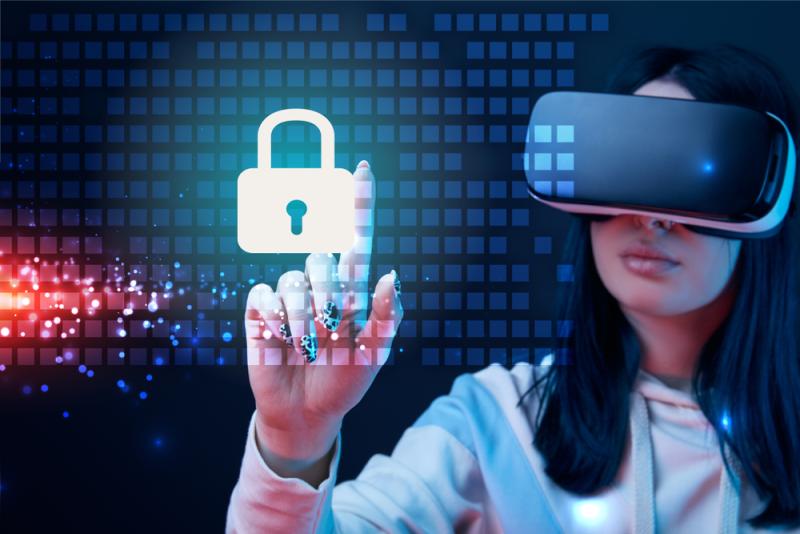What Are the Security Concerns in VR App Development for Businesses?

Virtual Reality (VR) is revolutionizing the way businesses interact with customers, streamline operations, and deliver immersive experiences. From training simulations and virtual meetings to retail experiences and marketing campaigns, VR applications are creating groundbreaking opportunities.
However, with this rapid adoption comes a crucial challenge which is security concerns in VR app development. Businesses must prioritize safeguarding sensitive data, user privacy, and operational integrity to ensure long-term success in this dynamic space with the help of experienced VR app development companies.
In this article, we will discuss:
What are the Major Security Challenges in VR App Development?
Data Privacy and User Consent
One of the most significant concerns in VR app development is the collection and usage of user data. VR applications gather vast amounts of personal and behavioral data, including biometrics (eye movements, gestures, voice), location data, and usage patterns. This information can be exploited if not managed securely.
Businesses must implement strict data privacy policies and secure user consent before collecting any information. Transparency is key. This involves informing users about what data is being collected, how it will be used, and who will have access to it.
Cyberattacks and Data Breaches
VR applications, like any digital platform, are vulnerable to cyberattacks. Hackers can exploit vulnerabilities to access sensitive business information or compromise user data. These breaches can lead to financial losses, reputational damage, and legal repercussions.
To mitigate this, businesses should adopt robust cybersecurity measures, such as encryption protocols, multi-factor authentication (MFA), and regular software updates with the help of top VR App development companies.
Device and Network Security
VR devices and applications often rely on network connectivity to function, exposing them to potential threats such as Distributed Denial of Service (DDoS) attacks, man-in-the-middle (MITM) attacks, and unauthorized access.
Businesses should secure their networks with firewalls, Virtual Private Networks (VPNs), and secure Wi-Fi connections. Moreover, VR devices must be equipped with strong security protocols to prevent unauthorized firmware modifications or data interception.
Identity and Access Management
In a VR environment, identity verification becomes crucial to prevent unauthorized access to sensitive areas or data. Weak IAM policies can lead to unauthorized users exploiting VR platforms to gain access to confidential information or manipulate operations.
Businesses must implement robust IAM solutions using the expertise of an established VR app development company. These measures ensure that only authorized individuals can access specific functionalities or data within the VR app.
Malware and Ransomware Attacks
Malware and ransomware attacks pose a growing threat to VR applications. Malicious software can infiltrate VR platforms, disrupt operations, steal data, or lock critical systems until a ransom is paid.
Developers should prioritize secure coding practices and incorporate antivirus and anti-malware solutions into VR applications. Regularly scanning the platform for potential threats and ensuring software updates are rolled out promptly can minimize the risk of such attacks.
Phishing and Social Engineering Attacks
Social engineering attacks, such as phishing, are common in the digital space and can target VR environments. For example, users may be tricked into sharing login credentials or downloading malicious content disguised as legitimate updates.
To combat this, businesses must educate users and employees about recognizing phishing attempts. Multi-factor authentication and secure update mechanisms can further enhance security by preventing unauthorized actions.
Secure Payment Systems
For VR applications enabling e-commerce transactions, payment security is paramount. Cybercriminals can target payment gateways or user data during transactions, leading to financial theft or fraud.
Businesses must integrate secure payment systems compliant with Payment Card Industry Data Security Standards (PCI DSS). Encryption, tokenization, and secure socket layer (SSL) certificates are essential to safeguarding payment transactions within VR apps.
Protecting Intellectual Property (IP)
VR applications often involve proprietary content, designs, or business processes that represent valuable intellectual property. Without proper security measures, these assets can be copied, misused, or stolen.
Businesses should use encryption, watermarking, and digital rights management (DRM) solutions to protect their IP within VR environments. Legal agreements, such as non-disclosure agreements (NDAs), can also serve as an added layer of protection.
Regulatory Compliance
The regulatory landscape surrounding VR applications is constantly evolving. Businesses must comply with data protection laws such as the General Data Protection Regulation (GDPR), California Consumer Privacy Act (CCPA), or industry-specific regulations.
Failure to comply with these laws can result in severe penalties. Developers should work closely with legal experts to ensure the VR application meets all relevant regulations, particularly concerning data handling, storage, and sharing.
User Safety and Ethical Concerns
VR applications can sometimes expose users to psychological or physical risks, such as disorientation or motion sickness. Beyond physical safety, businesses must also address ethical concerns related to the manipulation of user behavior or exposure to inappropriate content.
Integrating safety features like user-controlled exits, content moderation, and guidelines for responsible usage can enhance user safety and build trust in the application.
Wrapping Up
Security in VR app development is a critical consideration for businesses seeking to leverage this transformative technology. By addressing concerns such as data privacy, cyberattacks, device security, and regulatory compliance with the help of a leading VR app development company, businesses can build trust and deliver outstanding VR experiences.
Comments